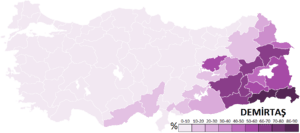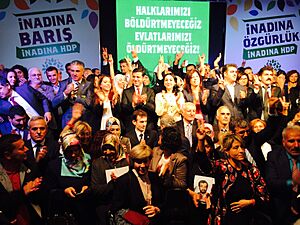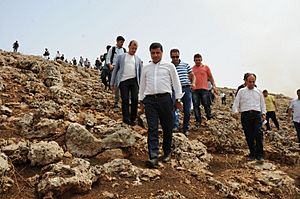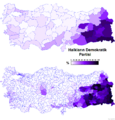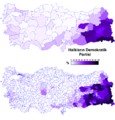Selahattin Demirtaş facts for kids
Quick facts for kids
Selahattin Demirtaş
|
|
|---|---|
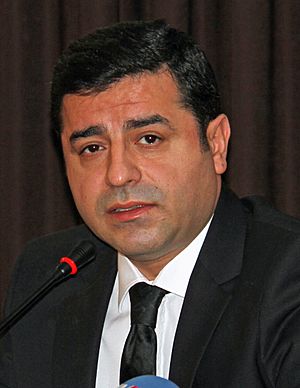
Demirtaş, 2015
|
|
| Chairman of the Peoples' Democratic Party | |
| In office 22 June 2014 – 11 February 2018 Serving with Serpil Kemalbay
|
|
| Preceded by | Ertuğrul Kürkçü |
| Succeeded by | Sezai Temelli |
| Co-chair of the Peace and Democracy Party | |
| In office 1 February 2010 – 22 April 2014 Serving with Gültan Kışanak
|
|
| Preceded by | Mustafa Ayzit Demir Çelik |
| Succeeded by | Party abolished See Democratic Regions Party |
| Member of the Grand National Assembly | |
| In office 22 July 2007 – 7 July 2018 |
|
| Constituency | Diyarbakır (2007) Hakkari (2011) Istanbul (I) (Jun 2015, Nov 2015) |
| Personal details | |
| Born | 10 April 1973 Palu, Elazığ, Turkey |
| Citizenship | Turkey |
| Political party | Democratic Society Party (2007–2008) Peace and Democracy Party (2008–2014) Peoples' Democratic Party (2014–2020) |
| Spouse |
Başak Demirtaş
(m. 2002) |
| Children | 2 |
| Relatives | Nurettin Demirtaş (brother) |
| Alma mater | Ankara University |
Selahattin Demirtaş (born 10 April 1973) is a Turkish-Kurdish politician, lawyer, and author. He was a co-leader of the Peoples' Democratic Party (HDP), a political party that supports Kurdish rights. He served alongside Figen Yüksekdağ from 2014 to 2018. Selahattin Demirtaş announced that he left politics after the May 2023 elections.
Demirtaş ran for president in the 2014 election, finishing in third place. He led the HDP to achieve significant results in the June 2015 and November 2015 parliament elections. He has been in prison since November 4, 2016. Despite his imprisonment, the HDP chose him as their candidate for the 2018 presidential election.
The European Court of Human Rights (ECHR) stated in December 2020 that Demirtaş's continued detention had a political purpose. This was because his detention happened during important elections and a time when Turkey was silencing opposing voices.
Contents
Early Life and Education
Selahattin Demirtaş was born on April 10, 1973, in Palu, Elazığ, Turkey. He grew up in a Zaza family and completed his early schooling there. In 1991, he began studying maritime business at Dokuz Eylül University. However, he faced political issues that made him leave without finishing his degree.
He returned to Diyarbakır and took the university entrance exam again in 1993. After that, he enrolled in the Law Faculty at Ankara University.
Professional Career
After graduating from law school, Demirtaş worked as a lawyer on his own. In 2000, he joined the executive committee of the Human Rights Association (IHD) in Diyarbakır. When the IHD Chair, Osman Baydemir, became mayor of Diyarbakır, Demirtaş took over as the chair of the Diyarbakır IHD in 2004. During his time as chair, the association focused on investigating unsolved political murders in Turkey.
Early Political Journey
Demirtaş has said that attending the funeral of human rights lawyer Vedat Aydın in 1991 was a turning point for him. He realized that being Kurdish was part of his identity and his problems.
He began his political career in 2007 as a member of the Democratic Society Party (DTP). He was one of the 'Thousand Hope Candidates' and was elected to the Turkish Parliament. At 34, he became the party's Parliamentary Chief Officer. He supported allowing education in the Kurdish language and asked for equal rights for Turks and Kurds in the Turkish constitution.
In 2009, the DTP was closed down by a court order. The court claimed the party had connections to the Kurdistan Workers' Party (PKK). After this, DTP members of parliament moved to the Peace and Democracy Party (BDP). In 2010, the BDP elected Selahattin Demirtaş and Gültan Kışanak as its new co-chairs.
In the 2011 elections, Demirtaş was re-elected to parliament as an independent. He was part of a joint list called 'Labor, Democracy and Freedom'.
Becoming an Opposition Leader
Peace Process in 2013
Demirtaş was a co-chair of the BDP when the peace process began in Turkey. This process involved talks between the Turkish government and the PKK. He was one of the BDP politicians who met with Abdullah Öcalan on Imrali island during these peace talks.
2014 Presidential Campaign
In 2014, Demirtaş and Figen Yüksekdağ became co-chairs of the Peoples' Democratic Party (HDP). This new party grew from a group of different political parties. Demirtaş was one of three candidates in the 2014 presidential elections. He hoped to attract voters who supported left-wing ideas. He finished third with 9.77% of the votes.
2014 Local Elections
Demirtaş emphasized that gender equality and having more women in politics were important for their party. In October 2013, he announced that a female mayor was planned for Diyarbakır. In the 2014 local elections, Gültan Kışanak was elected Mayor of Diyarbakir. Februniye Akyol became Co-Mayor of Mardin.
June 2015 General Elections
Demirtaş was a co-leader with Figen Yüksekdağ during the June 2015 Turkish general election. This was the HDP's first time running in a general election. The HDP came in fourth place with 13.12% of the votes. This was the first time the party passed the 10% electoral threshold needed to enter parliament. They won 80 out of 550 seats.
Many people saw Demirtaş as a winner in this election. His party did better than expected and won as many seats as another major party. The international news often called Demirtaş the 'Kurdish Obama'. HDP supporters celebrated their success. Demirtaş said, "From now on, the HDP is Turkey's party. HDP is Turkey, Turkey is HDP."
Peace Talks End
In July 2015, the peace process between the government and the PKK, which the HDP helped with, ended. Demirtaş believed this happened because the ruling party lost votes in the June election. He thought they restarted the conflict to gain support. In July 2015, as violence increased, Demirtaş spoke out against violence from both sides. He called for more political freedom in South-East Turkey.
When Turkish authorities put a curfew on the city of Cizre in September 2015, HDP members of parliament, including Demirtaş, tried to march there. They were stopped by authorities for security reasons. He was allowed into the city only after the curfew was lifted on September 12.
November 2015 General Election
In August 2015, two months after the June elections and one month after the conflict restarted, early general elections were announced for November 2015. The HDP, led by Demirtaş, came third. They received 10.7% of the votes, just barely passing the 10% parliament threshold.
2016 to 2018 Presidential Campaign
In May 2016, the Turkish parliament removed parliamentary immunity for several HDP politicians, including Demirtaş. This meant they could be prosecuted.
After a coup attempt on July 15, 2016, Demirtaş stated he was against it. He said the attempt showed that Turkey still lacked full democracy.
On November 4, 2016, Demirtaş was arrested along with Figen Yüksekdağ and other HDP members of parliament. They were accused of spreading propaganda for groups fighting the Turkish state. Demirtaş stated that he was not a "manager, member, spokesperson, or sympathizer" of the PKK.
On May 4, 2018, Demirtaş was officially announced as the HDP's candidate for the presidential election. He ran his campaign from prison. He received 8.4% of the votes.
Legal Situation and Detention
Selahattin Demirtaş was arrested on November 4, 2016. He has been in prison in Edirne, a city far from his family in Diyarbakır. His wife visits him once a week.
The European Court of Human Rights (ECHR) has called for his release. They stated that his arrest in 2016 violated his freedom of speech and his right to participate in elections.
On November 20, 2018, the ECHR ruled that Demirtaş should be released from detention. They ordered Turkey to pay him 25,000 Euros. However, a Turkish court ruled on November 30, 2018, that he should remain in prison. They said the ECHR ruling was not final and therefore not binding.
On December 22, 2020, the ECHR again told Turkey to release Selahattin Demirtaş. The Court believed that removing his parliamentary immunity and detaining him before trial was politically motivated. This step happened after the ruling party lost its majority in parliament.
In March 2021, Demirtaş was sentenced to three years and six months in prison. This was for allegedly insulting the Turkish President Recep Tayyip Erdoğan in a speech.
As of July 2025, discussions are ongoing about the possible release of Selahattin Demirtaş. This debate comes amidst signs from President Erdoğan and his allies that they might be changing their approach to Kurdish issues.
Personal Life
Demirtaş is of Zaza origin and speaks the Zaza language. He describes himself as "Kurdish Zaza."
Demirtaş is married to Başak Demirtaş. They have two daughters, Delal and Dılda. His parents are Tahir and Sadiye Demirtaş, and he has six siblings.
Demirtaş has faced threats because of his political work. On November 22, 2015, he survived an assassination attempt.
Awards and Recognition
In November 2019, the Progressive Alliance gave Selahattin Demirtaş their Political Courage Award. His wife, Başak Demirtaş, accepted the award because he was still in prison.
In 2022, he received the Political Courage Award from the Institute François Mitterrand. Hişyar Özsoy from the HDP accepted the award on Demirtaş's behalf.
Images for kids
See also
 In Spanish: Selahattin Demirtaş para niños
In Spanish: Selahattin Demirtaş para niños



